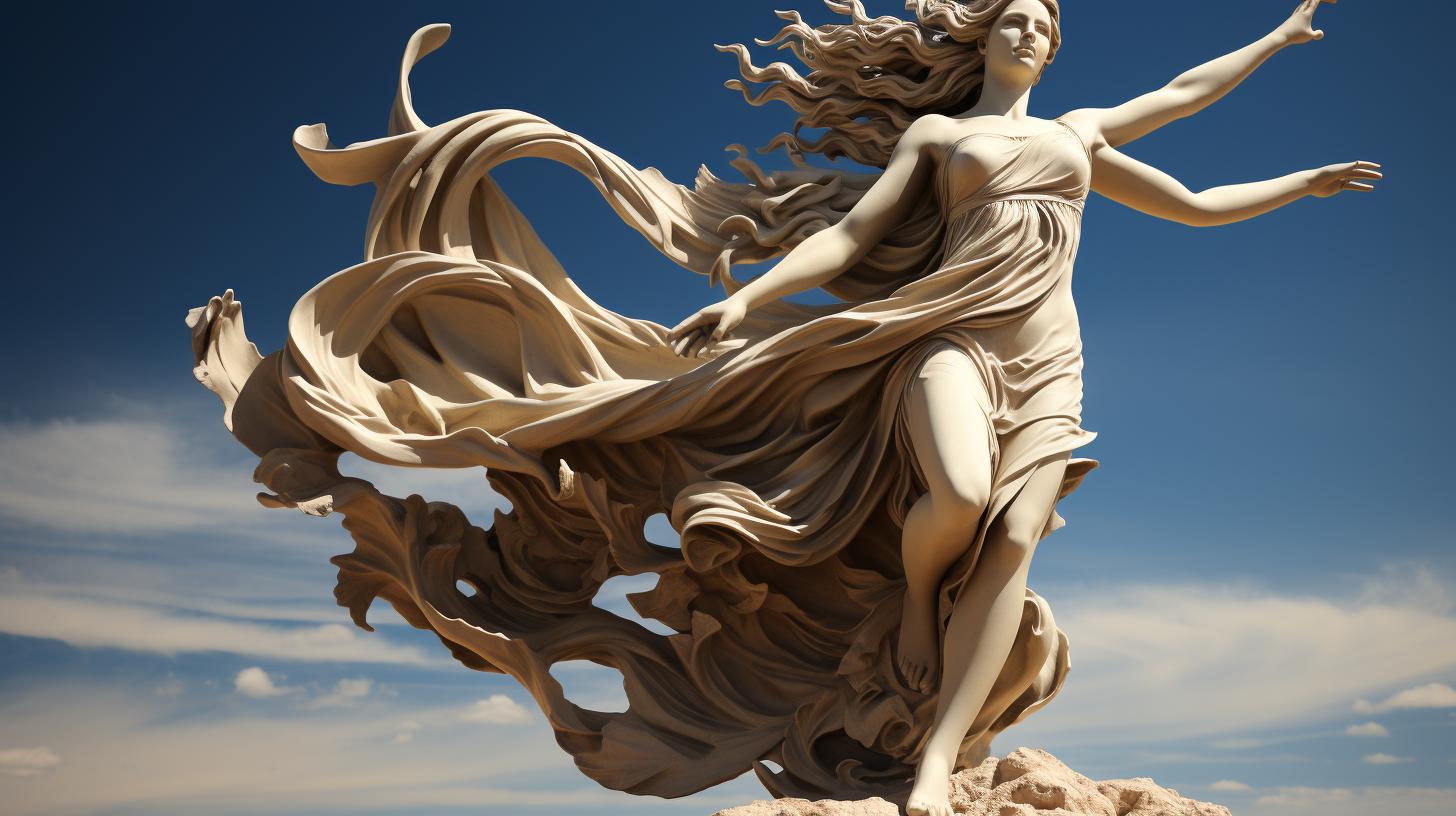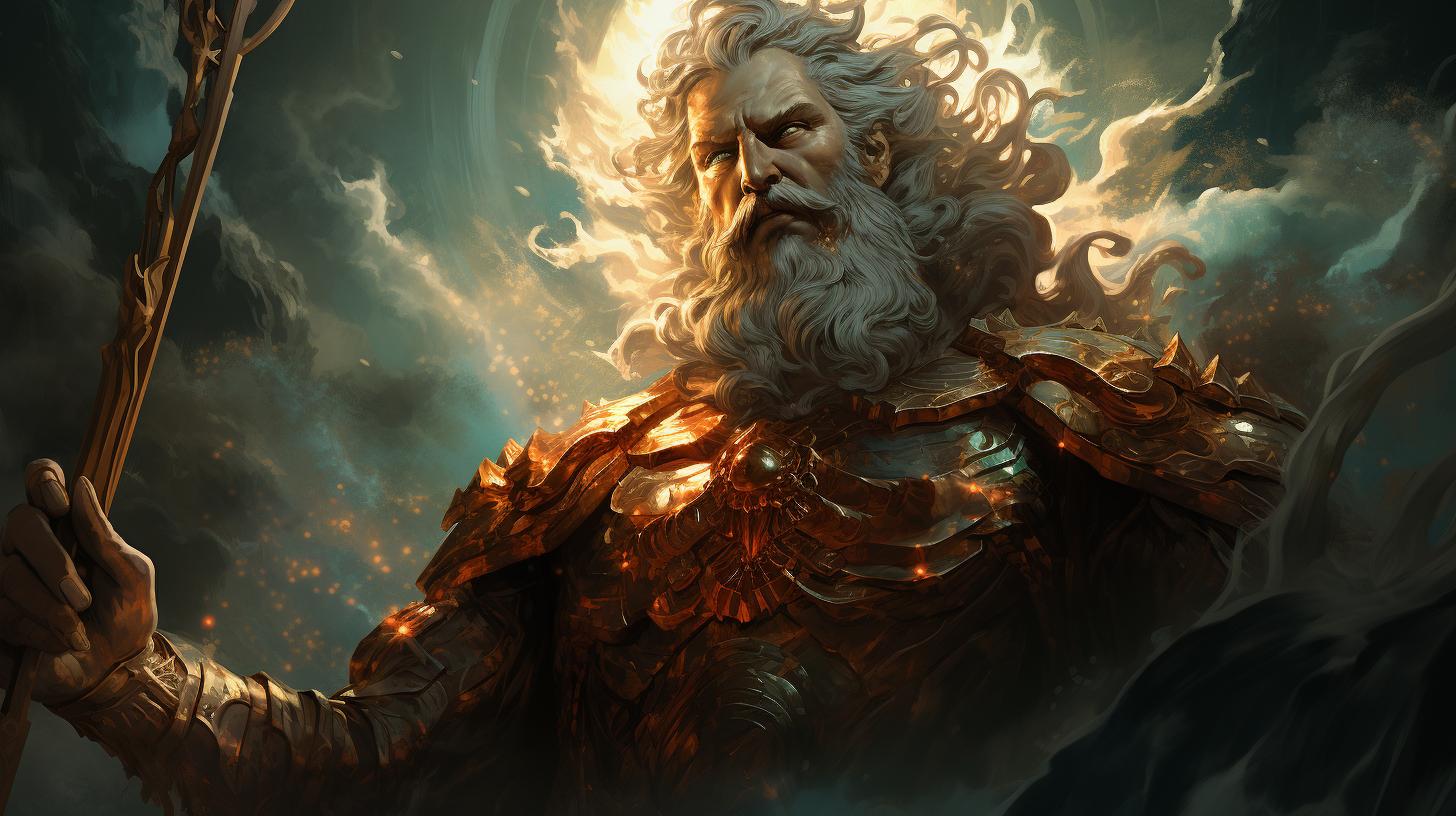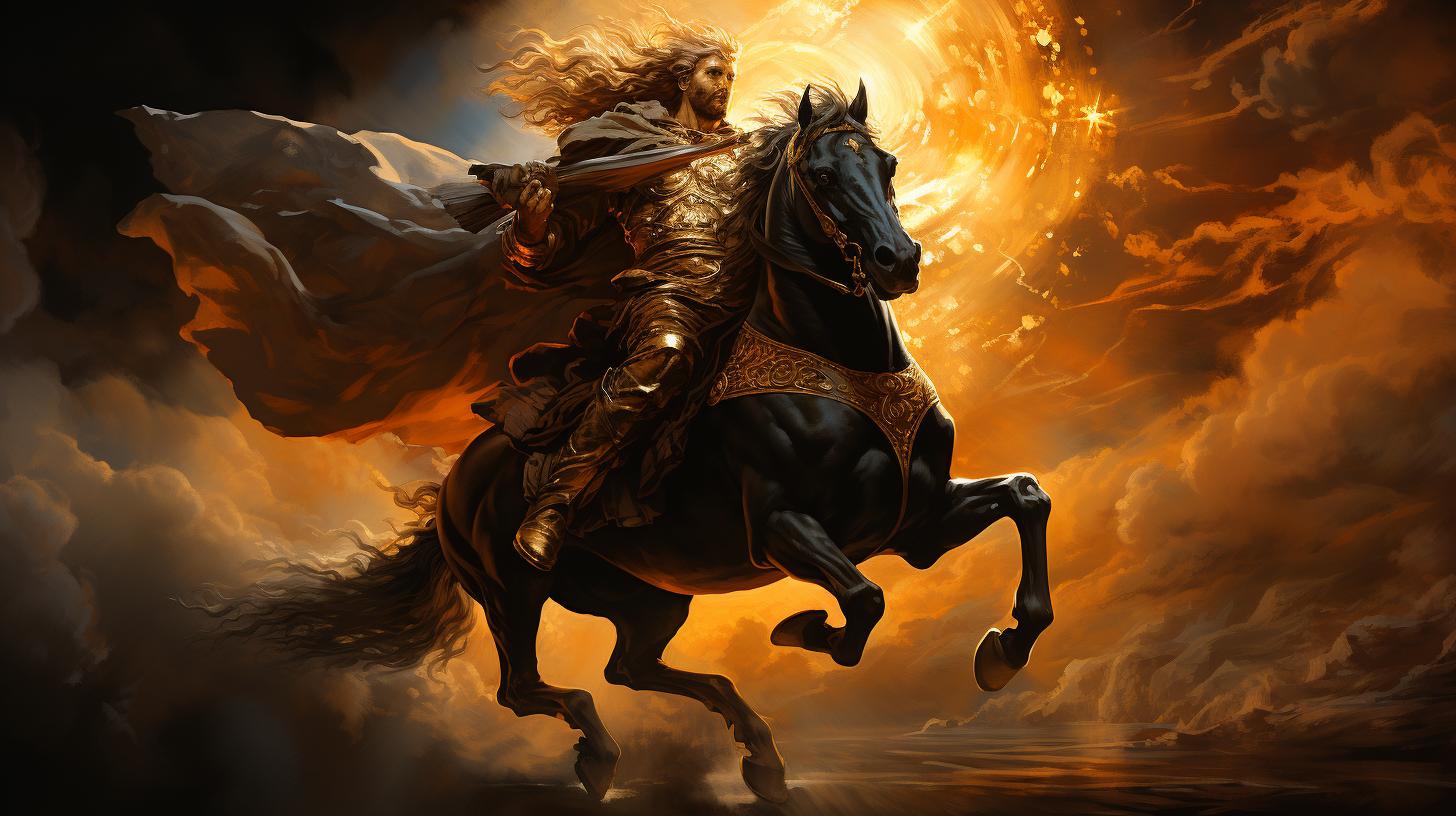Nike the Greek Goddess of Victory: Unveiling the Powerful Essence of Greek Mythology

Nike the Greek goddess of victory, a prominent figure in ancient Greek mythology, personified triumph in various domains such as art, music, war, and sports. Represented as a winged deity alongside Athena and Zeus, Nike held a significant role in the divine court, mediating success between gods and mortals.
Renowned artistic depictions, including Paeonius’ sculpture and the iconic Winged Victory of Samothrace, highlight Nike’s enduring legacy. Exploring her associations with Athena and Zeus, Nike showcased her loyalty and bestowed victory upon the deserving.
Both a symbol of Greek heritage and an influential deity in modern society, Nike continues to inspire triumph and success today.
The Origins and Significance of Nike in Greek Mythology
Nike, the Greek goddess of victory, holds a prominent place in the rich tapestry of Greek mythology. This section delves into the mysteries surrounding her origins and explores the profound symbolism and representations associated with her divine persona.
We also examine Nike’s pivotal role in the epic Titanomachy, the legendary battle between the gods and the Titans.
Exploring the Origins of Nike, the Greek Goddess of Victory
The exact origins of Nike remain shrouded in mythological ambiguity. Scholars debate whether she emerged as an independent deity or as a facet of another goddess, such as Athena. While her precise etymology remains uncertain, speculation suggests a pre-Greek origin or a derivation from the Proto-Indo-European word “neik-,” meaning to attack or begin vehemently.
Symbolism and Representation of Nike in Ancient Greece
Nike’s representation varied depending on the context. As an attribute of Athena, she appeared without wings, symbolizing the goddess’s association with wisdom and strategy in warfare. When depicted independently, Nike adorned majestic wings, embodying the swift and transformative nature of victory.
She often carried symbols such as a palm branch, a crown, or Hermes’ staff.
Nike in the Titanomachy: Her Role in the Battle of Gods vs Titans
In the epic conflict between the gods and the Titans, Nike proved her allegiance by siding with Zeus, becoming an attendant of Athena and a symbol of her prowess in battle.
Not only did she participate actively in the divine court, but Nike also presided over competitions, judging the excellence of gods and mortals while granting victory to the deserving. Her influence in the Titanomachy shaped the course of the gods’ triumph over the Titans.
Nike and Athena: The Bond between a Goddess and Her Warrior
The relationship between Nike, the Greek goddess of victory, and Athena, the goddess of wisdom and warfare, is deeply intertwined in Greek mythology. This section explores the dynamic connection between these two powerful deities and the significance of their bond.
Nike’s Association with Athena and Their Connection
Nike’s association with Athena is one of profound significance. It is believed that Nike served as a devoted attendant to Athena, acting as an extension of her power and authority.
Together, they formed a formidable duo, embodying the virtues of victory and strategic intellect.
Nike as Athena’s Attribute: An Emblem of Wisdom and Victory
Within the realm of Greek mythology, Nike became a symbol of Athena’s wisdom and military prowess. As an attribute of Athena, Nike conveyed the goddess’s strategic brilliance and ability to secure triumphant outcomes in battles.
Nike’s presence by Athena’s side represented the divine assurance of victory bestowed upon her chosen warriors.
The Collaborative Power of Athena and Nike in Greek Mythology
The collaboration between Athena and Nike in Greek mythology showcased their collective power and influence. They worked in harmony to guide mortals towards success on the battlefield and in various endeavors.
Nike’s presence amplified Athena’s authority, imbuing her actions with an aura of invincibility and triumph.
- Athena and Nike’s partnership exemplified the seamless coordination between wisdom and victory.
- Their combined influence inspired warriors to exhibit both strategic brilliance and unwavering determination.
- Together, they formed an indomitable force that instilled fear in their adversaries and instilled confidence in their followers.
In Greek mythology, Nike’s bond with Athena stands as a testament to the intertwined nature of wisdom and victory, emphasizing the importance of both intellect and strength in attaining triumph.
Nike and Zeus: The Divine Patronage and Influences
In Greek mythology, Nike played a pivotal role in the divine court, particularly in relation to Zeus. Her loyalty to Zeus was unwavering, and she held a prominent position as his servant.
Nike’s dedication to Zeus symbolized her alignment with the supreme ruler of the gods, emphasizing her status as a powerful deity in her own right.
Nike’s Loyalty to Zeus and Her Position as a Servant
Nike’s unwavering loyalty to Zeus was evident throughout Greek mythology. Serving as a devoted servant, she ensured that Zeus’ supremacy was upheld and recognized among the gods and mortals.
Her position as a servant to Zeus showcased her commitment to his divine authority, establishing her as a revered figure within the pantheon.
Nike in the Divine Court: Judging Competitions and Granting Victory
Nike’s involvement in the divine court went beyond her role as a servant. She was often called upon to judge competitions among the gods and mortals, assessing their excellence and granting victory to the deserving party.
Nike’s discernment and ability to bestow success solidified her significance as a mediator of triumph and showcased her unique relationship with Zeus.
Nike’s Role in Zeus’ Triumphs: Interplay of Power and Victory
Nike’s connection to Zeus extended beyond her service in the divine court. She played a significant role in Zeus’ triumphs, often standing by his side as a representation of victory.
Nike’s presence reinforced Zeus’ power and authority, bringing harmony between the divine realm and mortal world. Together, their interplay of power and victory highlighted the strength and influence that Nike embodied as the goddess of victory.
The Cultural Depictions and Symbolism of Nike
Explore the captivating depictions and powerful symbolism associated with Nike, the Greek goddess of victory.
Artistic Representations of Nike in Greek Art and Sculpture
In Greek art and sculpture, Nike was portrayed in various forms, showcasing her significance and influence. Artists masterfully captured her essence, emphasizing her wings and graceful presence. From intricate statues to intricate reliefs, Nike’s representation in ancient Greek art remains awe-inspiring.
The Famous Nike of Samothrace: An Icon of Victory and Beauty
One of the most celebrated artistic depictions of Nike is the Winged Victory of Samothrace. This iconic sculpture, created to commemorate a naval battle, captures Nike in motion, standing atop the prow of a ship.
Her flowing garments and dynamic pose symbolize not only triumph but also beauty and grace.
Nike’s Attributes: Palm Branch, Crown, and Hermes’ Staff
In artistic representations, Nike is often depicted holding significant attributes. The palm branch, symbolizing victory and peace, is a common motif associated with her. Additionally, she is seen wearing a crown, signifying her regality and divine status.
Sometimes, Nike is shown holding Hermes’ staff, symbolizing her role as a messenger between gods and mortals.
Nike’s Influence beyond the Pantheon: Victories and Success in Various Fields
Nike, the Greek goddess of victory, held significant influence that extended beyond the realm of gods and mortals, showcasing her power and impact in diverse fields. Let’s explore her significance in sports and athletic competitions, her role as a patroness of artists, musicians, and performers, and her connection to warfare and military triumphs.
Nike’s Significance in Sports and Athletic Competitions
Nike’s association with victory naturally made her a figure of profound importance in the realm of sports and athletic contests. Athletes sought her favor and invoked her name to gain an edge in their pursuits.
From ancient Greece to the present day, Nike continues to inspire athletes, symbolizing the pursuit of excellence, determination, and undying triumph in sporting events.
Nike’s Role as a Patroness of Artists, Musicians, and Performers
Beyond her role in sports, Nike’s influence extended to the realms of art, music, and performance.
As a patroness of creativity, she bestowed her blessings upon artists, musicians, and performers, granting them the spirit of victory in their respective crafts. Many creative souls invoked her name to seek inspiration and achieve greatness in their artistic endeavors.
- She inspired painters and sculptors to create masterpieces that captured the essence of triumph and victory.
- Composers and musicians called upon Nike to guide their melodies, symbolizing the victorious spirit in their musical creations.
- Actors and performers sought her favor for flawless and triumphant performances on stage, channeling her energy to captivate audiences.
Nike’s Connection to Warfare and Military Triumphs
Nike’s association with victory also manifested in the realm of warfare and military conquests.
Ancient Greek warriors called upon her to secure triumph on the battlefield, seeking her favor to attain success against their enemies. Her presence in military campaigns became symbolic, inspiring soldiers to fight courageously and emerge victorious in their battles.
- Leaders and strategists looked to Nike as a source of inspiration, believing that her blessings would bring victory to their armies.
- Her depiction carrying the staff of Hermes served as a powerful symbol, signifying swiftness, strategic acumen, and unyielding determination in times of conflict.
- Warriors honored her name and sought her guidance for not only military triumphs but also for overall success in life.
Nike’s influence and connection to victories and success in various fields continue to inspire and motivate individuals across different aspects of human endeavor.
Her lasting impact stands as a testament to the enduring power of triumph and the pursuit of excellence in achieving greatness.
Nike as a Mediator of Success: Bridging the Gap between Gods and Mortals
In Greek mythology, Nike, the goddess of victory, served as a crucial link between the divine realm of gods and the mortal world.
Through her role as a mediator, Nike bestowed triumph upon mortals in their pursuits, shaping their destinies and granting victory in their endeavors.
Nike’s Shaping of Destiny: Granting Victory to Mortals in Their Pursuits
Nike played a pivotal role in shaping the destinies of mortals by granting them victory in their pursuits.
Whether it was in battles, competitions, or creative endeavors, Nike’s influence ensured that mortals achieved success in their endeavors. She empowered athletes and warriors to surpass their limits and emerge victorious, infusing them with the strength and determination to overcome obstacles and attain glory.
Nike’s Involvement in Human Affairs: Her Impact on Mortal Lives
With her presence in human affairs, Nike had a powerful impact on mortal lives. She instilled a sense of inspiration, instigating individuals to strive for greatness and reach their full potential.
Nike’s influence extended beyond individual achievements; she played a part in shaping the destiny of nations, as her favor could sway the outcomes of wars and conflicts. Her guidance and support embodied the essence of victory and served as a driving force for mortals to pursue their dreams.
The Enduring Legacy of Nike: Her Influence on Modern Society
The influence of Nike, the goddess of victory, transcends ancient mythology and continues to resonate in modern society. Her ideals of triumph, perseverance, and success are deeply ingrained in various aspects of our lives.
Nike’s legacy lives on through her symbol, the iconic swoosh, which represents power, determination, and achievement. The brand Nike, named in homage to the goddess, embodies her spirit and serves as a constant reminder of the enduring influence of victory.
Exploring Nike’s Legacy Today: Immortalizing the Goddess of Victory
Nike and the Modern World: Her Presence in Sports and Popular Culture
The influence of Nike, the Greek goddess of victory, extends beyond ancient mythology and has left an indelible mark on the modern world. In today’s society, Nike continues to be associated with sports and athletic achievements.
Her name has become synonymous with victory, symbolizing the pursuit of excellence and success in various competitive fields.
From professional sports to amateur competitions, athletes strive to embody the spirit of Nike, channeling her power and determination in their pursuit of triumph.
Nike’s presence in sports is evident not only through her symbolic representation but also through sponsorships and endorsements, as athletes proudly don the iconic Nike swoosh logo, representing their connection to the goddess of victory.
Beyond sports, Nike’s image and symbolism have permeated popular culture. The concept of victory and the association with Nike are often referenced in movies, books, and other forms of media. Her influence can be seen in motivational speeches, where the mention of Nike serves as a powerful reminder of the rewards that come from dedication and perseverance.
Nike’s Inspiration for Branding: Examining the Athletic Company’s Name
The athletic company Nike, founded in 1964, drew inspiration from the Greek goddess of victory for its brand name. The founders, Bill Bowerman and Phil Knight, recognized the powerful symbolism associated with Nike and aimed to capture its essence in their athletic footwear and apparel.
The name Nike reflects the company’s dedication to excellence and success. Much like the goddess herself, Nike’s products are created to enhance performance and help individuals achieve their goals. The association with Nike adds a sense of prestige and aspiration, connecting consumers with the idea of victory and accomplishment.
Over the years, Nike has successfully built a strong brand identity, leveraging the goddess’s legacy to inspire customers and become one of the leading athletic brands worldwide. Today, the Nike brand is instantly recognizable, embodying the spirit of victory and serving as a constant reminder of the goddess’s enduring influence.
Nike the Greek Goddess of Victory: A Timeless Symbol of Triumph and Success
Nike, the Greek goddess of victory, remains a timeless symbol of triumph and success. Her legacy transcends time and continues to inspire individuals in their pursuit of greatness. From ancient Greece to the modern world, Nike’s influence is a testament to the power of victory and the indomitable spirit of human achievement.
As we embark on new challenges and strive for our own victories, Nike’s enduring presence serves as a reminder of the strength and tenacity required to overcome obstacles. Her image, whether depicted as a winged deity or through artistic representations, evokes the desire for achievement and the pursuit of greatness.
Today, Nike’s image can be found not only in museums and historical texts but also in our daily lives. Whether in sports, popular culture, or branding, Nike’s influence as the goddess of victory resonates with people worldwide, keeping her legacy alive and immortalizing her as a symbol of triumph and success.
.




















